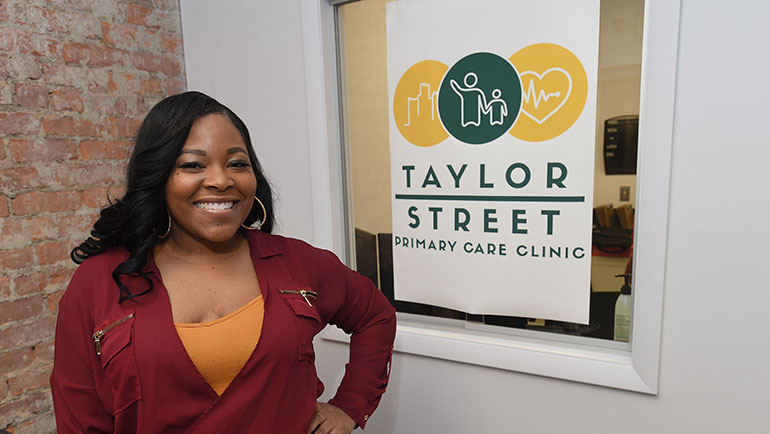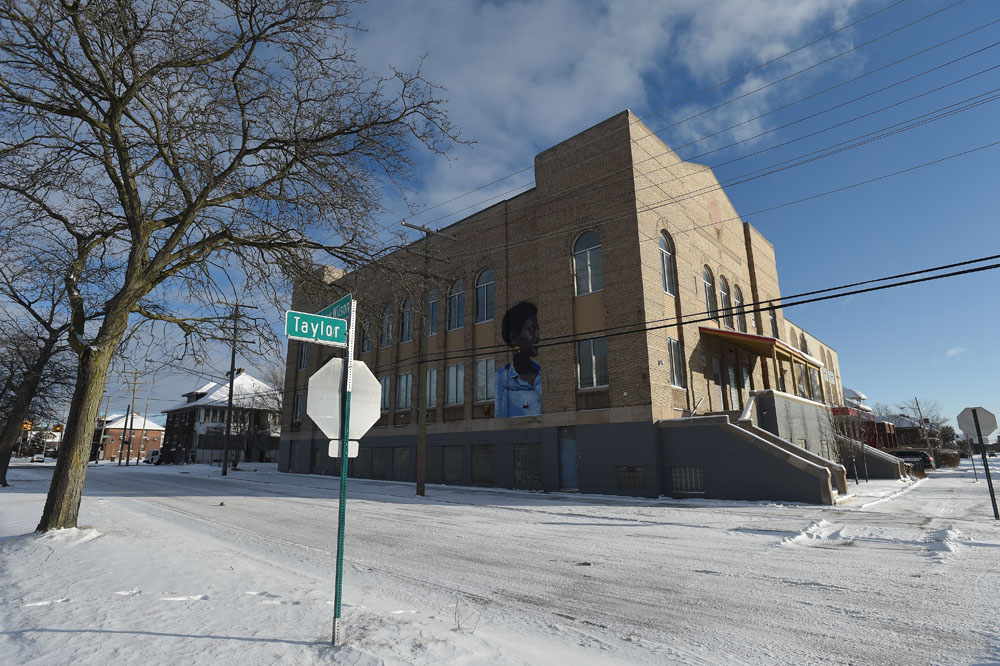Community care: New clinic offers care to Detroit residents

A new clinical partnership is providing an opportunity to embed primary care-educated nurse practitioners in a local neighborhood and further the College of Nursing’s commitment to its urban community.
Now open for video, phone, and in-person appointments, the clinic is a collaborative academic-clinical effort between the College of Nursing and the Central Detroit Christian Community Development Corporation (CDCCDC). Located in Detroit’s Virginia Park neighborhood, the clinic is located within the former Tried Stone Baptist Church, which also houses CDCCDC’s headquarters. Through this partnership with the college’s Nursing Practice Corporation (NPC), the clinic will offer full-service primary care to local residents.
“It’s been our desire to open a clinic in the Detroit community for quite some time, and this is our opportunity to do that,” said Ramona Benkert, PhD, associate dean for academic and clinical affairs in the College of Nursing and vice president of the NPC. “It is a full-service, nurse practitioner-run family practice clinic, treating everyone from infants to older adults.”
Formed 25 years ago with the goal of educating, employing and empowering local residents, CDCCDC offers a number of resources and programs for community members of all ages, and is engaged in a number of initiatives to equip local residents with job skills and revitalize the community. The clinic, operating out of CDCCDC’s headquarters, provides another tangible way to help meet residents’ needs.
The clinic uses a nurse practitioner-run model, similar to how the Campus Health Center — also under the management of the NPC — operates. While there has long been a plan to open a clinic in a local neighborhood and several partnerships were discussed in the past, Benkert said, none were the right fit. When the possibility of collaborating with CDCCDC came about, the college was intrigued.
“Wayne State pursued us,” said CDCCDC Executive Director Lisa Johanon. “We have the same mission: We’re committed to serving underserved people.”
 Once the partnership was formed, the first step was to talk with community members to better understand their needs.
Once the partnership was formed, the first step was to talk with community members to better understand their needs.
“In developing our business plan, the first thing we did was conduct a community survey. We went to where CDCCDC was already active and asked what services residents wanted,” said Benkert. “We learned a ton from that.”
Virginia Park is home to many lower-income families, many of whom are uninsured and face challenges that go behind the needs of emergency rooms, where many traditionally turn to for care.
“They want premier care, but they also want places where they can find out more about community resources,” said Benkert. “They wanted to be made aware of those things, which is more than you usually have access to in a traditional primary care physician’s office.”
The nurse practitioner-run model allows for holistic care. Patients are able to meet with nurses to discuss specific issues, and the staff will provide education about community resources that can help with issues related to prescriptions, finances, transportation and education. This ties in not only with the College of Nursing’s mission to provide clinical care to the local community, but also with CDCCDC’s goal of empowering residents.
“This is what nurse practitioner-run clinics do well,” said Benkert. “It’s not, ‘Let me listen to your heart and lungs, here’s your prescription and I’ll see you in two months.’ It involves a knowledge of the social determinants of health. It’s not just physical health. It’s physical, social and emotional. We’ve been doing that successfully at the Campus Health Center, and many on our board have worked for years in nurse practitioner-run practices. We know how to do it well and collaborate well with physicians.”
That, Johanon said, is what the community residents are looking for.
“Doctors are necessary, and there will be that collaboration, but doctors don’t get to spend a lot of time with patients,” Johanon said. “People in the neighborhood need to be heard and listened to; also, sometimes people from lower-income families or who are uninsured are looked down upon. I believe this clinic will provide a place where people will be respected and treated, so that the ER isn’t their primary care physician.”
The clinic opened briefly in February 2020 and closed to recalibrate for operating during the pandemic. It reopened in July 2020 for appointments with telehealth and telemedicine available. The clinic is in a newly remodeled, designated area of the former church and is a full-service clinic, including six examination rooms, lobby, conference room and more. While the College of Nursing is leasing the clinic space from CDCCDC, the Nursing Practice Corporation shared in the cost of the building. Staff members include one family practice nurse practitioner, a medical assistant, a front office clerk and a community health worker, with plans to expand staff as need increases. College of Nursing students will also benefit from the opportunity to gain firsthand clinical experience at the location.
“This is an education site, a clinical and academic partnership,” said Benkert, who added that the clinic also offers the possibility for interdisciplinary experiences. “We will have nurse practitioner students here, as well as our undergraduate community health and public health students. We will start out with just the nursing students, but eventually there will likely be nutrition students, pharmacy students, social work students and other professionals on site.”
“We have to get people to understand why we’re here and who we are,” said Benkert. “It’s a completely different clinic model than most practices, and sometimes people need a bit of an explanation about that model.”
Johanon said the collaboration with Wayne State has been positive, and local residents inquired throughout the summer about when the clinic would open. Benkert said that in addition to helping the university and CDCCDC accomplish their shared mission of caring for urban communities, the clinic also presents a model for how nonprofit organizations and academia can work together to improve care in urban areas.
“What’s really unique about this clinic is that it truly is an academic and community partnership,” she said. “From the very outset, it’s been a collaboration between our board and the CDCCDC — and that’s how we want it to be. It’s not just, OK, we’re a primary care clinic and we’re going to just jump into your community. It’s ‘Here we are; what do you need?’”